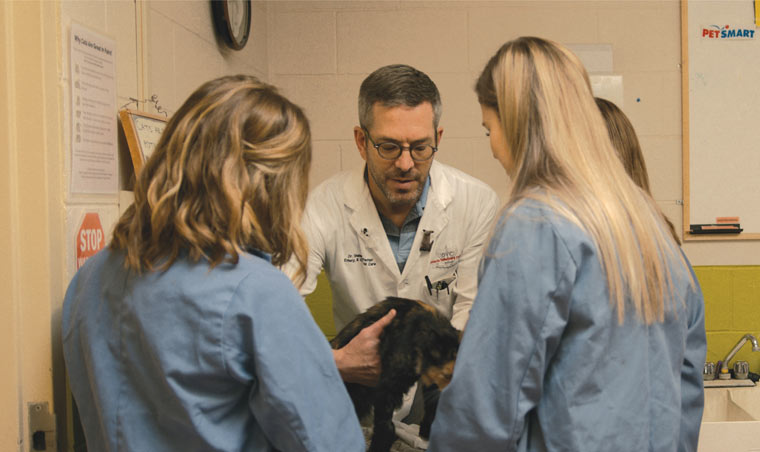
January 15, 2020
Canadian veterinary colleges teach access to care
Students at two Canadian veterinary colleges will graduate with a better understanding of how to remove barriers to clients accessing care, thanks to funding meant to revolutionize veterinary education and services.
Last November, the University of Guelph Ontario Veterinary College announced it had received an $11 million donation—the largest in the college’s history—from Kim and Stu Lang through their Angel Gabriel Foundation.
University President Franco Vaccarino said OVC will work with community partners to ensure its veterinary students graduate with the skills and knowledge to support and lead programs that expand animal health care for underserved populations, including identifying and removing barriers to access.

“This generous gift will bring together professionals serving vulnerable animal and human populations to allow us to learn from each other, address social inequities and share knowledge using an interdisciplinary One Health approach,” Vaccarino said in a Nov. 4, 2019, press release.
The donation will create the Kim and Stu Lang Community Healthcare Partnership Program, the first academic program of its kind in Canada. It will expand initiatives such as OVC’s community outreach and spay-neuter programs that provide veterinary services for shelters and underserved and remote communities.
This generous gift will bring together professionals serving vulnerable animal and human populations to allow us to learn from each other, address social inequities and share knowledge using an interdisciplinary One Health approach,.
Franco Vaccarino, president, University of Guelph Ontario Veterinary College
The CHPP will enhance and develop partnerships with humane societies, veterinary outreach organizations, and social service agencies already doing important work in community health care. The CHPP will drastically expand opportunities for student experiential learning, including a clinical rotation where OVC will partner with northern indigenous communities.
The program also will include graduate training and specialization in community or shelter medicine to educate future specialists and help establish evidence-based best practices. Previously, such training was available only outside of Canada.
Capital improvements on campus will enhance clinical facilities to accommodate the expanded medical and surgical offerings. Operational funding will support equipment, supplies, and personnel to deliver programs at the university, in surrounding communities, and remotely, according to the release.
Further, the gift will support a full-time veterinary director, an academic professorship, staff, and student scholarships as well as intern and resident training programs in community medicine. Remy’s Fund, named for one of the Langs’ rescue dogs that received life-saving cancer treatments at OVC, will be created to subsidize medical care for animals in need.
“This gift will allow us to catalyze one of the most significant developments in clinical training we have seen in recent decades,” said Dr. Jeff Wichtel, dean of Ontario Veterinary College, in the release.
 Meanwhile, the University of Prince Edward Island Atlantic Veterinary College in November announced it had received a $50,000 grant from the U.S.-based Stanton Foundation’s program to develop courses on canine care.
Meanwhile, the University of Prince Edward Island Atlantic Veterinary College in November announced it had received a $50,000 grant from the U.S.-based Stanton Foundation’s program to develop courses on canine care.
Dr. Michelle Evason, an associate professor of small animal internal medicine, is using the funding to develop a new third-year elective course that will teach veterinary students to identify and define the spectrum of care and give them the tools they need to address the issue.
The spectrum of care is defined as the availability and accessibility of veterinary medical care regardless of the socioeconomic status of the pet owner.
The course, thought to be the first of its kind to be taught at a veterinary college in Canada, will be offered in the winter 2020 semester.
Using the knowledge and skills they have gained in their veterinary education, third-year students will learn to develop diagnostic and treatment options that span the full spectrum of care for common clinical conditions, determine the likelihood of success of the options, and design communication plans to help clients make informed and shared decisions. Local veterinarians in private practice will be involved in teaching and evaluating the course, sharing their experiences, and mentoring the students.